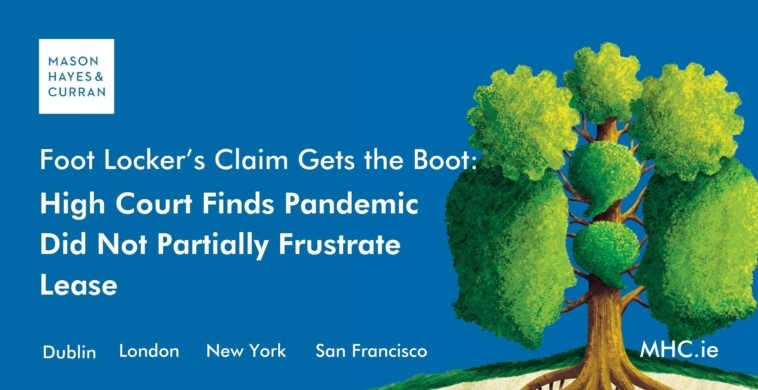
The High Court, in a judgment delivered last week, rejected Foot Looker Retail Limited’s (Foot Locker) claim against its landlord Percy Nominees Limited that it was entitled to not pay rent for a specific period on grounds that its lease was partially frustrated due to closures arising out of COVID-19 restrictions. This decision will be of interest to landlords and tenants alike whose premises have been affected by the COVID-19 restrictions.
Background
Following the outbreak of the COVID-19 pandemic in March 2020, Foot Locker was obliged to close its stores, including its Grafton Street store, following the introduction of emergency legislation by the Irish Government.
In June 2020, Foot Locker wrote to its landlord claiming that its lease was frustrated, and that Foot Locker was not liable for rent for the period March to June 2020 when the shop was forced/obligated to close. In response the landlord served a 21-day notice on Foot Locker seeking payment of all rent arrears, failing which they threatened they would petition to have Foot Locker wound up. In light of the threat of a winding up petition, Foot Locker issued proceedings and ultimately sought declarations that the lease was partially frustrated so that Foot Locker should not be obliged to pay the rent for the period it was closed. The landlord counterclaimed for payment of all of the outstanding rent.
Issues
Mr Justice O’Moore observed that there were two clear issues before the Court:
- Whether there is such a thing as partial frustration of a lease, and
- If such a concept exists, whether Foot Looker had established an entitlement to a declaration that the lease had been partially frustrated.
The Court’s Analysis
The doctrine of partial frustration
The Court noted that the essence of the doctrine of frustration is that a contract is treated as being at an end and both parties are free from their obligation to each other. The Court found that the case put forward by Foot Locker whereby it submitted it was free from any obligation to pay rent but entitled to continue to occupy the premises on grounds of partial frustration did “violence to the fundamentals of the doctrine”.
The Court found that the concept of partial frustration is at odds with the doctrine of frustration itself and any introduction of partial frustration would require legislation rather than development through case law.
Combination of clauses in the contract
Foot Locker submitted that since it was unable to comply with the “keep open” and “user” clauses in the lease during the emergency period, the lease was partially frustrated such that it should not have to pay rent. The Court rejected this contention noting that the obligation to keep the store open was one which was caveated by the reference to normal trading hours and reasonable times as well as a separate ‘comply with enactments’ clause in the lease.
Obligation to pay rent is not a severable obligation
The Mr Justice O’Moore referred to the recent judgment in the Oyster Shuckers case and agreed the obligation to pay rent is a basic requirement placed on the tenant by any lease and is not a severable obligation. Read a previous MHC article on the Oyster Shuckers case here.
Held
The Court concluded that the concept of partial frustration is not one which exists in Irish law and on that basis, Foot Locker’s claim failed. Although not necessary to address the second question on whether Foot Looker had established an entitlement to a declaration that the lease had been partially frustrated, Mr Justice O’Moore stated that he would have found that the forced closure of the store did not constitute a frustration of the lease.
The Court granted judgment for outstanding rent of just over €1 million to the landlord. Costs were also awarded to the landlord to include the costs of its counterclaim.
Conclusion
This judgment again confirms that the circumstances of the pandemic will not override fundamental contractual requirements such as the obligation to pay rent. Key takeaways to remember include:
- The doctrine of partial frustration does not exist in Irish law and any introduction of this doctrine would require legislative intervention
- The obligation to pay rent in a lease is not a severable obligation, and
- While COVID-19 restrictions may provide a reason for not meeting a contractual obligation, they do not necessarily cause a contract to be frustrated.
Read the full judgment here.
For more information, please contact a member of our Dispute Resolution or Real Estate teams.
The content of this article is provided for information purposes only and does not constitute legal or other advice.
Share this:




